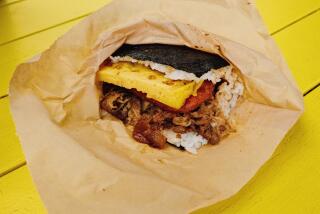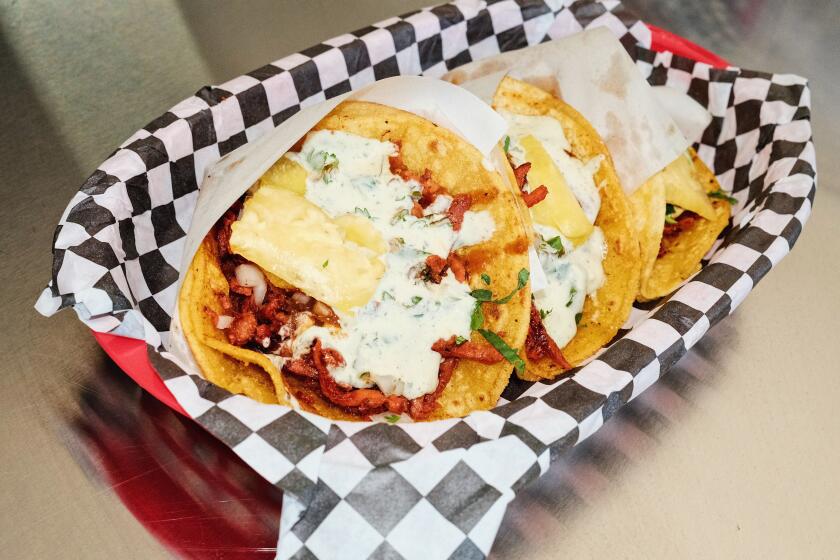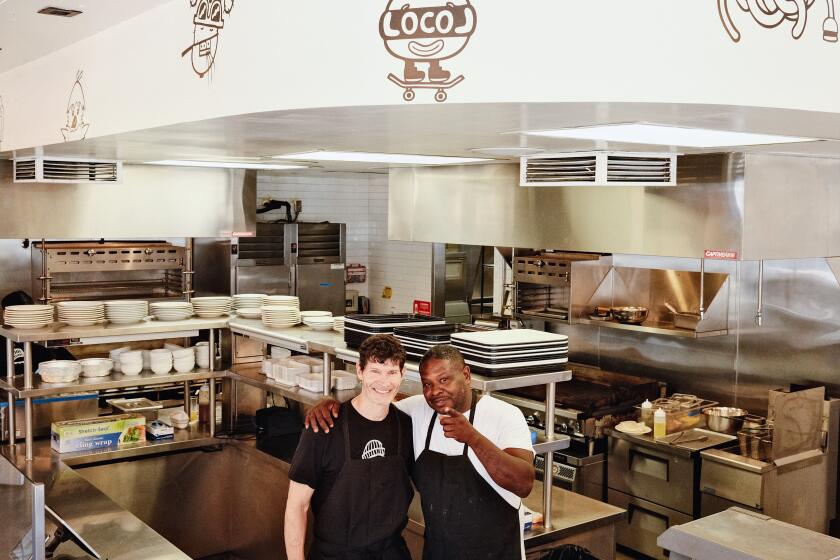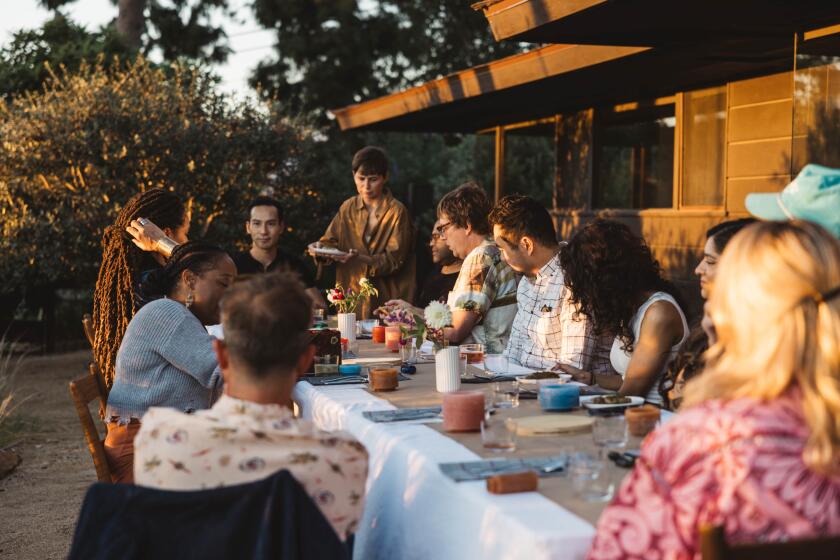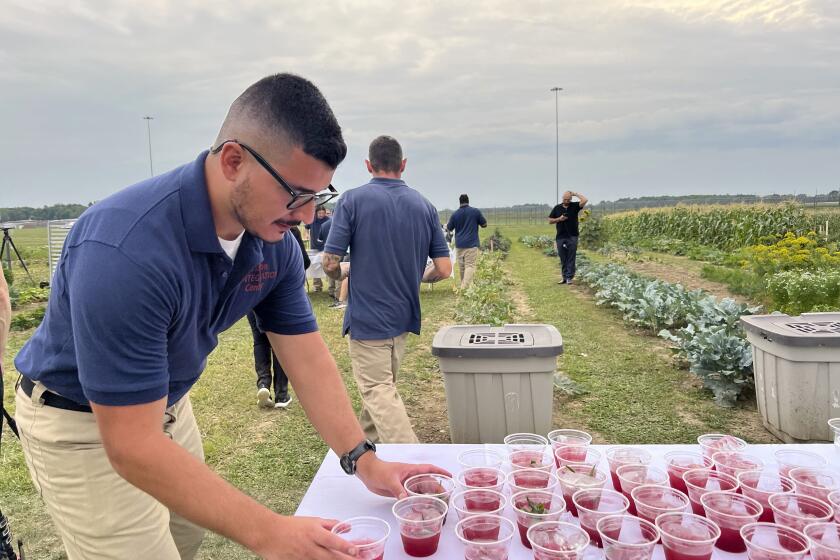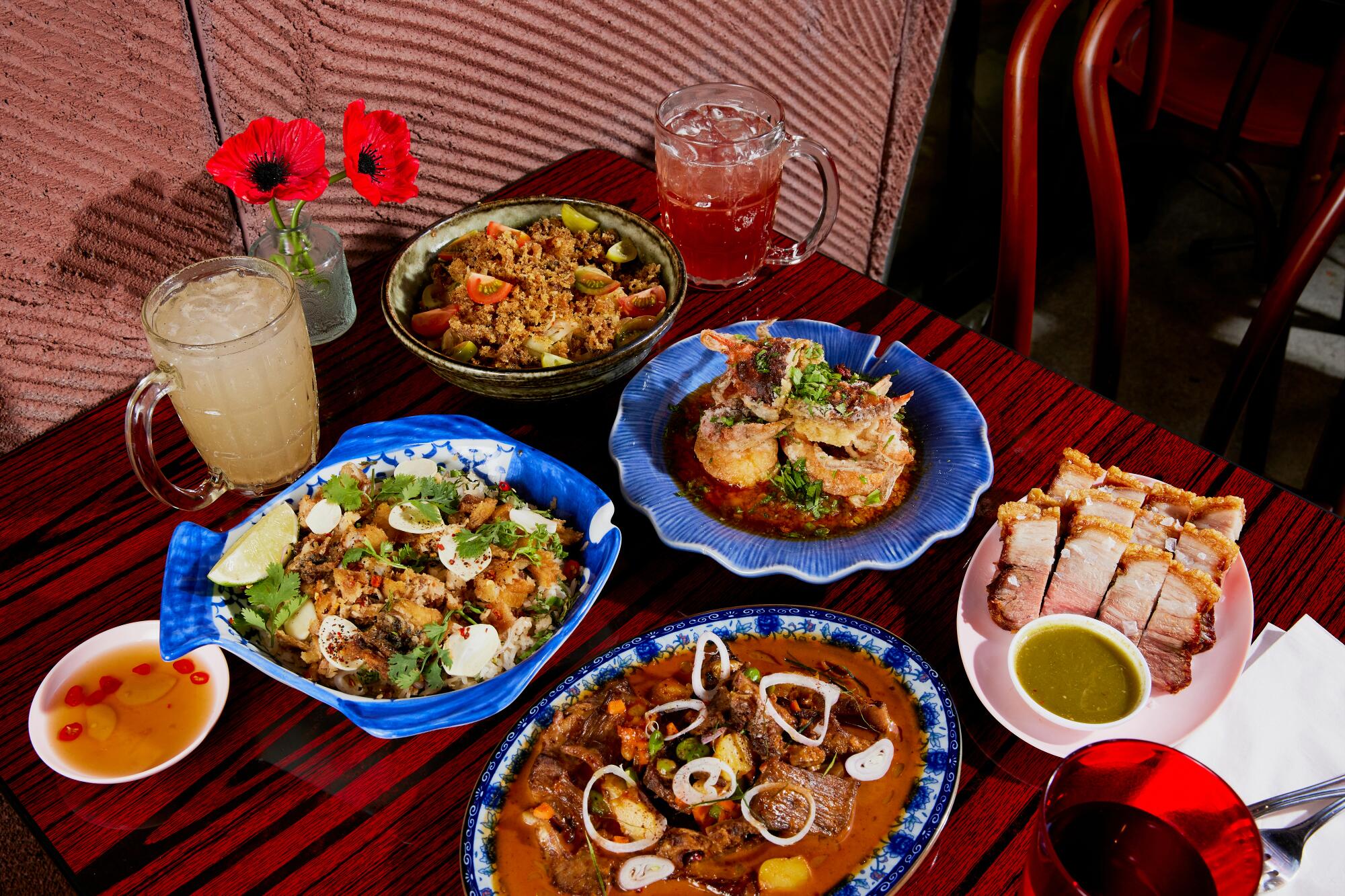
At the end of 2020, a red neon sign spelling the words “Holy Basil” appeared over a takeout window in a downtown food hall still under construction, and Thai dining in Los Angeles tilted slightly on its axis.
Wedchayan “Deau” Arpapornnopparat and Tongkamal “Joy” Yuon had begun the project as a pop-up in August of that year, serving a handful of rotating dishes gleaned from the Bangkok street-food canon. Pad see ew huffed with smokiness, the wok hei seared so deeply into the wide noodles that its potency could withstand even the indignities of carryout containers. So would the fluffy-crackly skin of moo krob, with a popping crunch that gave way to satiny pork belly meat underneath.
Gra prow (minced beef stir-fried with peppery holy basil, the herb for which the dish is named in Thai) pulsed with garlic and the citrusy heat of bird’s eye chiles. Ordered with a fried egg, its yolk managing to stay runny and its curled edges crisp, the dish both comforted and made the heart race — qualities that helped many of us feel human during those isolating days.
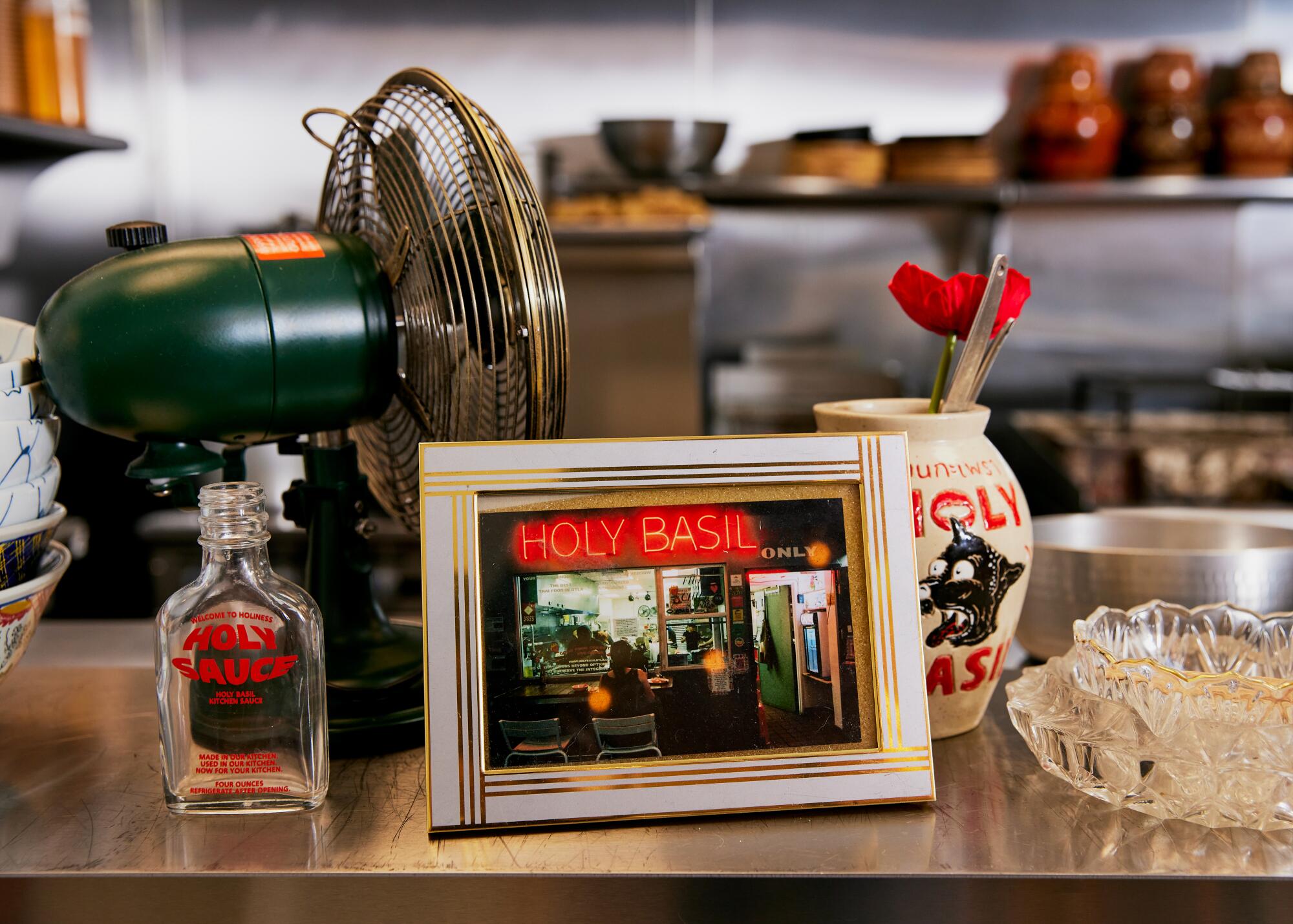
Holy Basil went through the expected phases of a business forged in the pandemic. Sometimes, the small staff ran deliveries themselves. By early 2021, customers could swing by the window to grab pick-up orders, and eventually seating filled out the Santee Passage food hall.
From the start, the city’s food obsessives homed in on Arpapornnopparat’s visceral, full-throttle style of cooking. As he’s settled in, his approach to the food has become more personal, and subtly experimental.
Baja meets Oceanside at Valle, but you’ll have to dive deep into the tasting menu at this modern Mexican restaurant from chef Roberto Alcocer.
That evolving tone drives the small, neighborhood-minded location of Holy Basil he and Yuon worked for nearly two years to open in Atwater Village in January.
Follow the address to Glenwood Boulevard and peer down the narrow space between two buildings to spy the telltale neon sign.
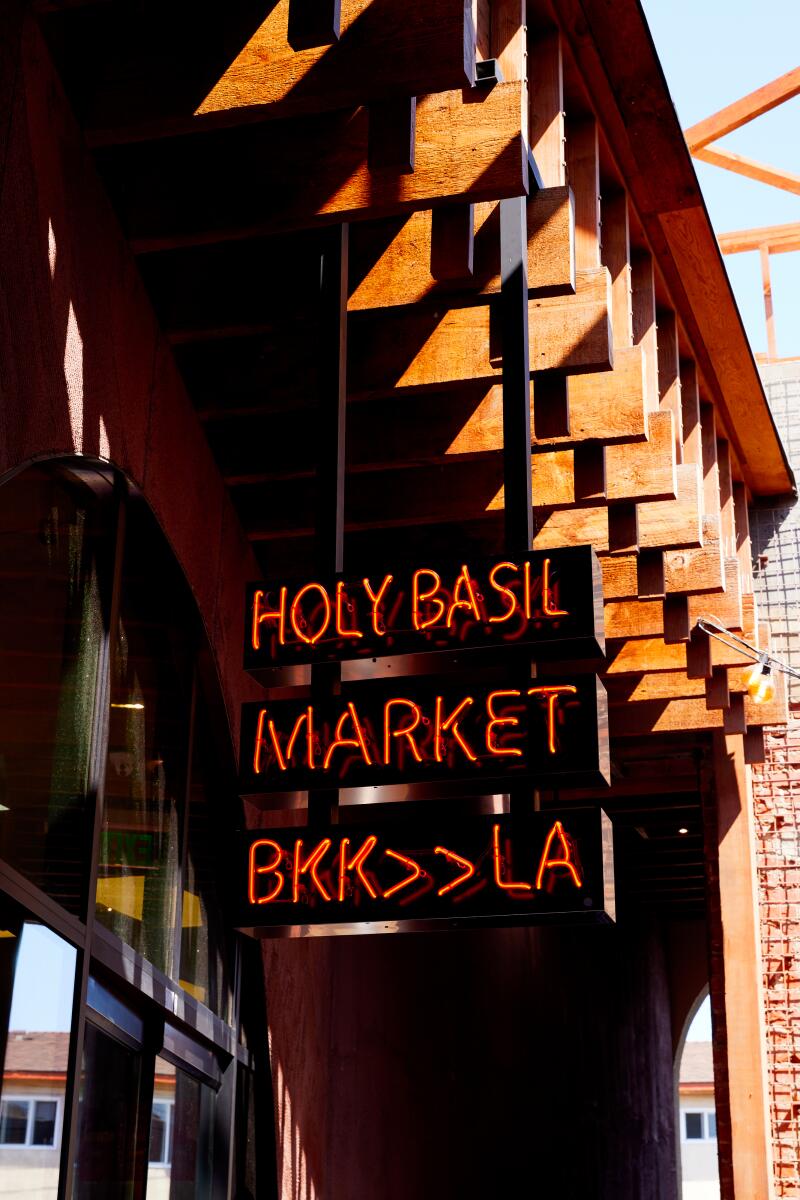
Holy Basil’s telltale neon sign.
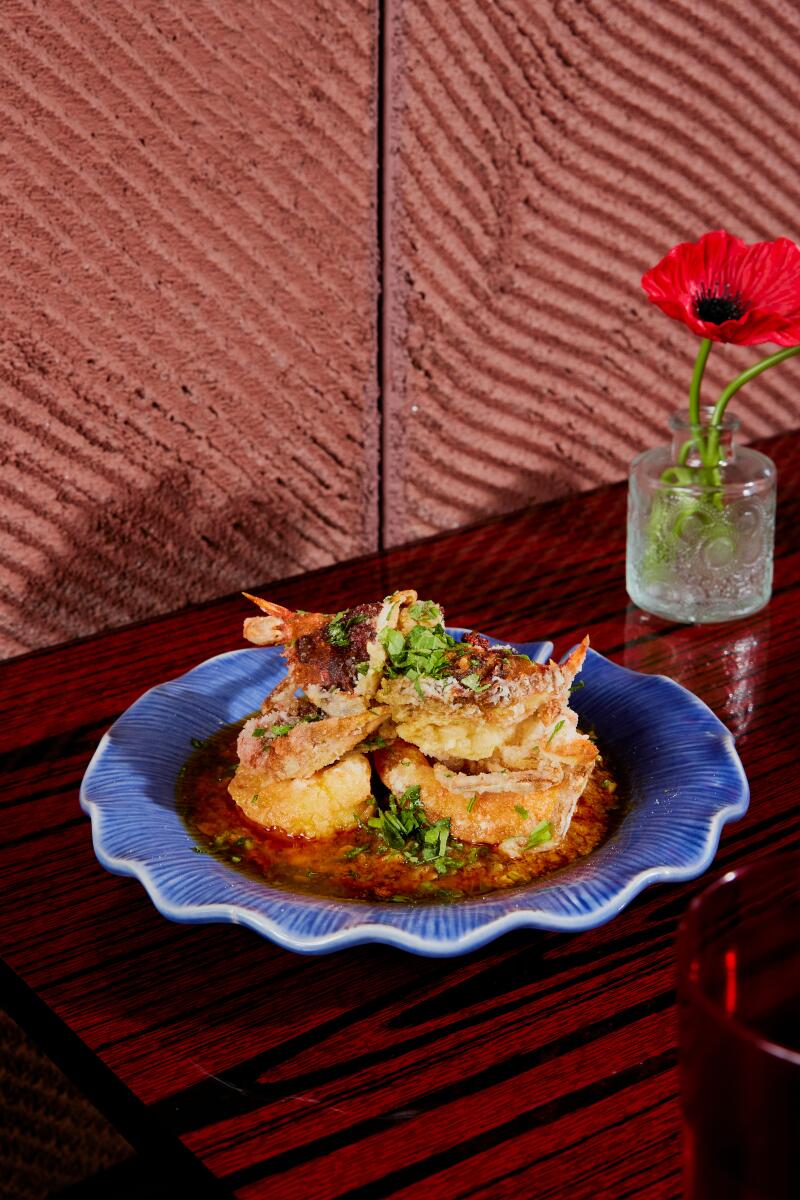
Holy Basil’s Soft Shell Crab with Salted Yolk.
Despite the lack of street presence, I wouldn’t exactly call the place hidden. With its row of outdoor tables set tight against an exterior wall, and its tiny dining room wrapped around an open kitchen, it’s rare that one of the restaurant’s 38 seats stays empty for long, day or night.
The moment feels ripe for Arpapornnopparat’s skill and narrative. Among specialties from dozens of L.A.’s standout restaurants, plenty of marquee dishes can be name-checked by their regions of origin. Chiang Rai-style sai ua, its sausage nearly fibrous with lemongrass and other coarse herbs, at Amphai Northern Thai Food. Sapp Coffee Shop’s soothing jade noodles, and the equally bolstering boat noodles inspired by Ayutthaya in Thailand, where rivers crisscross through the port city. Turmeric-stained kua kling, one of Jitlada’s many incendiary Southern Thai curries perfected by the late Suthiporn “Tui” Sungkamee, whose legacy his sister Sarintip “Jazz” Singsanong continues.
Arpapornnopparat considers tradition but also weaves his life’s trajectory into his recipes. He was born in Bangkok to a food-loving family; the table included dishes that reflected his father’s Chinese heritage. In sixth grade he left Thailand to attend school in Bangalore, India, and eventually relocated to the United States, studying to become a graphic designer. He and Yuon, who are married, met almost 20 years ago when they worked at Chan Dara on Pico Boulevard.
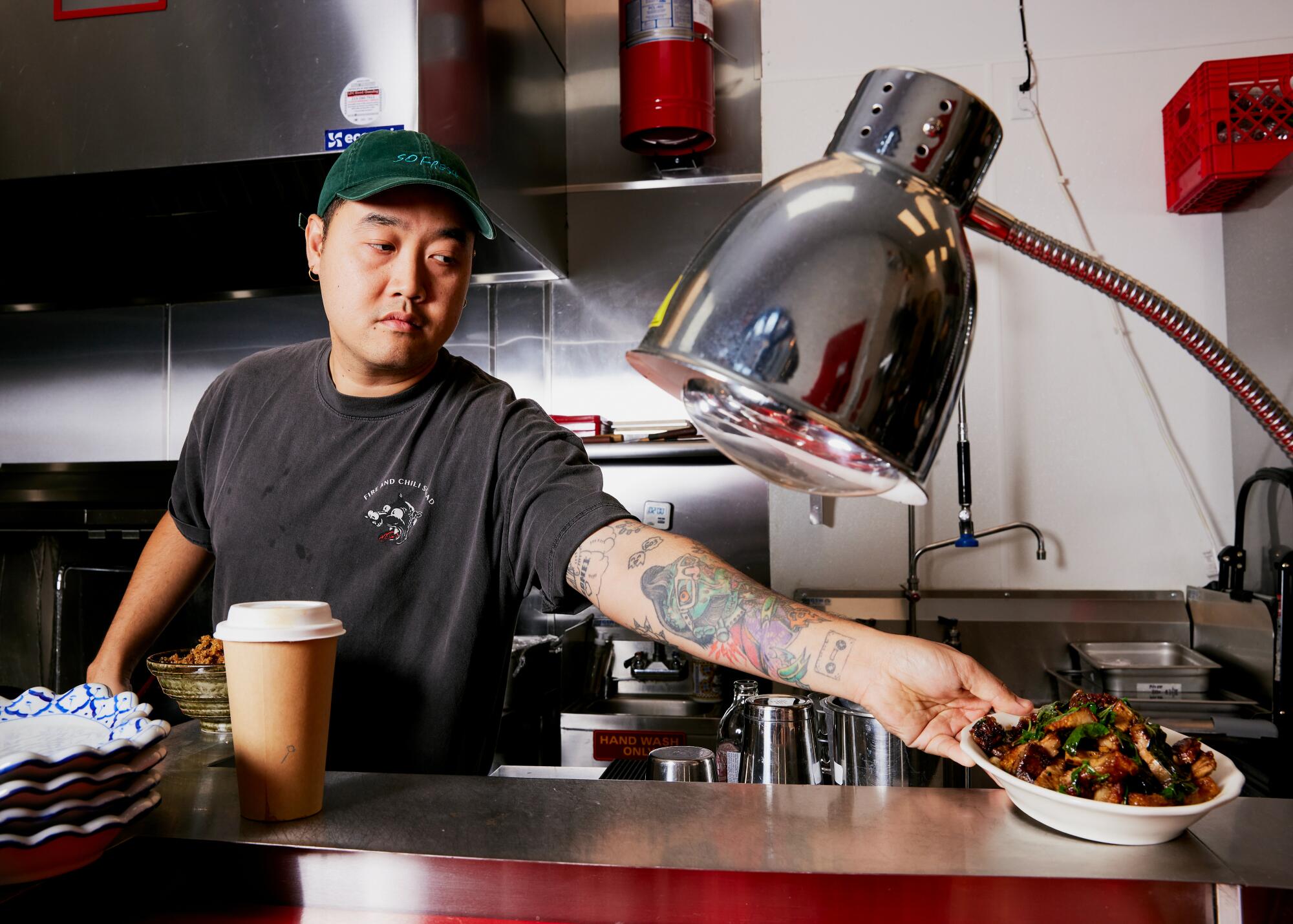
At Atwater Village, original Holy Basil favorites like pad see ew and gra prow have carried over, but the concise menu also leaves room for improvisational showpieces.
Take a recent dish centered around fried soft-shell crab and shrimp. It’s the chunky sauce that thrillingly confounds, riffing on a Bangkok staple of squid stir-fried with salted egg yolk. Arpapornnopparat repurposes the egg into the star ingredient, offsetting its umami savor with the sweetness of browned butter and then stirring in shrimp paste, shrimp oil, scallion oil and cooking wine. In its sharp left turns of salt and acid and sultry funk, the brain longs to consult a GPS. But there is no map. These are flavors from an interior land.
Here’s how to make one of Thailand’s most iconic, simple dishes at home — complete with a tart, funky condiment.
Another sauce-driven dish, built around daily-made gaeng garee (yellow curry) paste, began as a vehicle for whole cracked Dungeness crab before shrimp took the lead role. Juicy slices of Chinese celery break up the coconut-rich creaminess. You inhale the curry’s sweet and sharp spices before they register on the tongue. Coriander seed dominates, but only barely, and its floral notes bounce nicely off the scattering of Sichuan peppercorns that have been tempered in oil. They tingle as they snap against the teeth, but not so much that they flatten every bite that follows.
A bowl of rice is handy alongside to mop up as much of the sauce as possible.
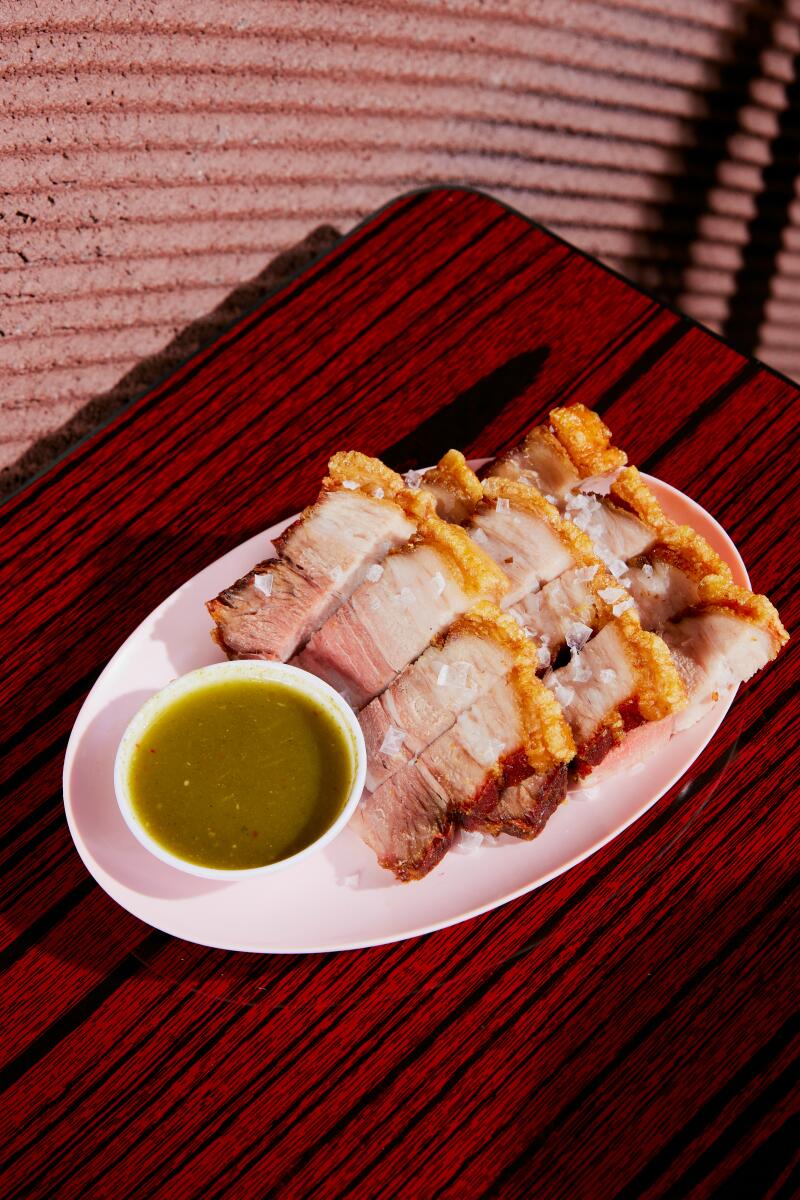
Fluffy-crackly skinned moo krob — pork belly with a popping crunch.
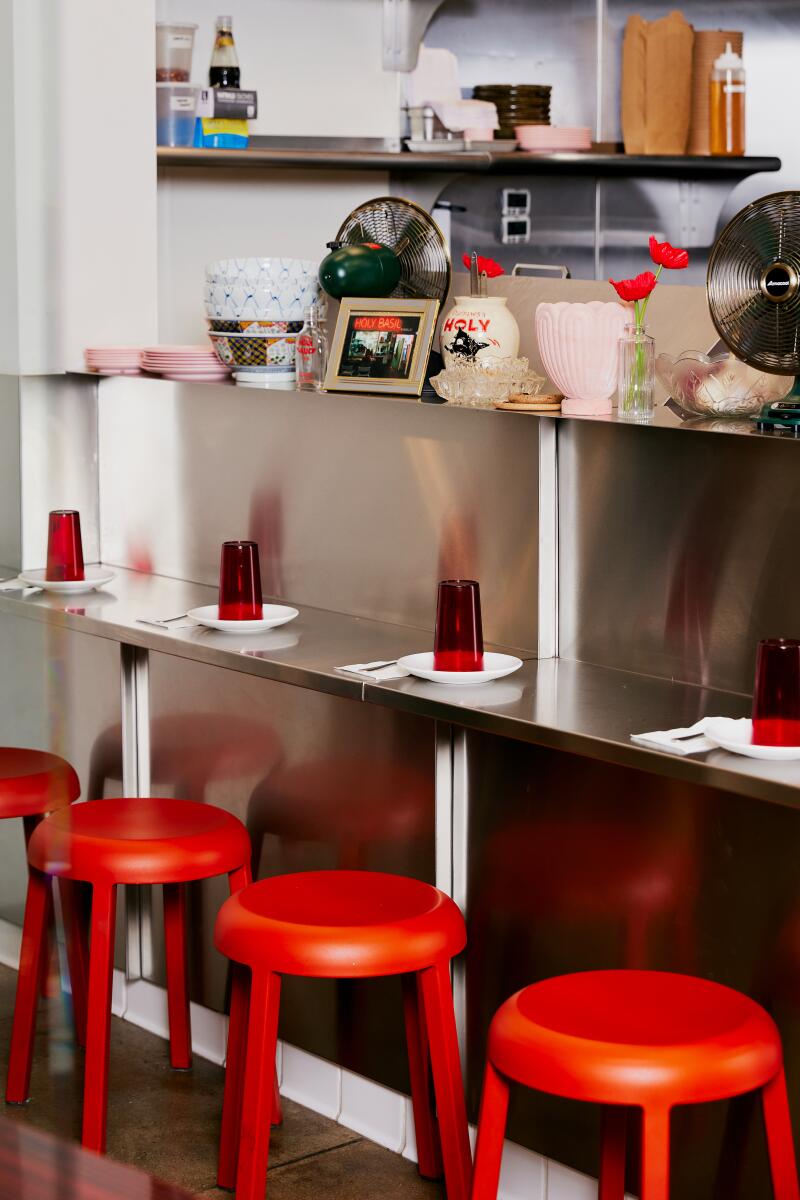
Pull up a stool at the new Holy Basil in Atwater.
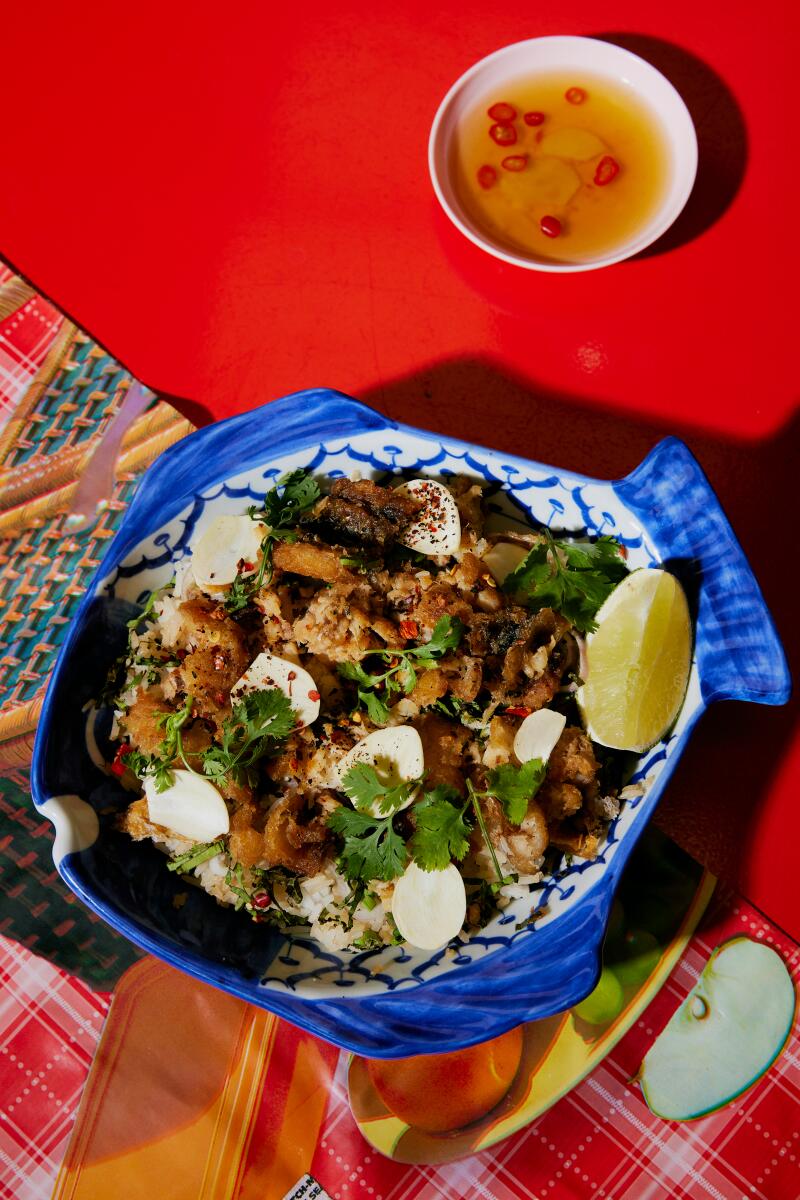
Grandma’s fish and rice.
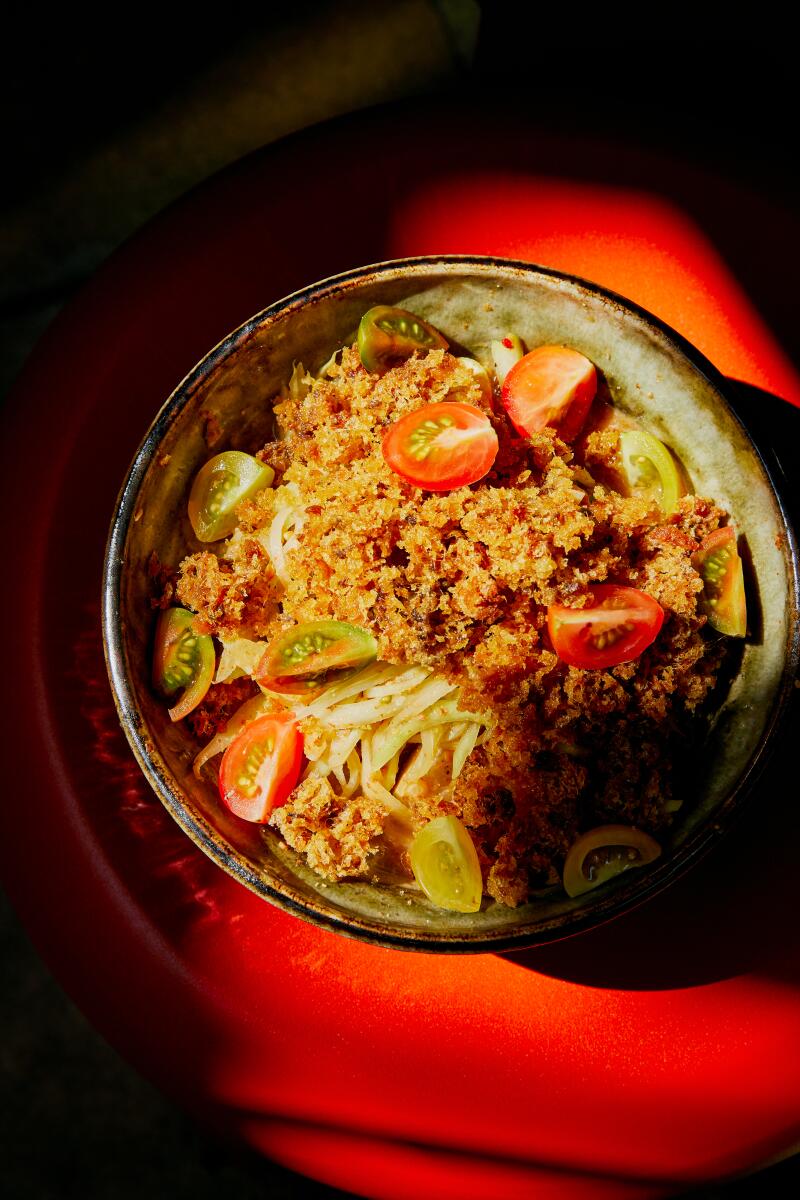
Holy Basil’s papaya salad.
Counterbalance these intricacies with some straightforward options: the moo krob, its skin, as from the downtown kitchen, as satisfying as tearing into a hot chicharrón; fried chicken wings paired with a handful of shishito peppers; an easy-listening duet of eggplant and autumn squash in a light black bean sauce perfumed with basil leaves. Interpretations of shrimp aguachile and a riff on beef tataki awash in chile-flecked lime vinaigrette winningly nod to two of L.A.’s tentpole cuisines.
I set out to get a handle on the enigma that is Star Leaf, the new Pasadena restaurant that the ladies in my mom’s mah-jongg group have been chatting about since it opened in the former Roy’s space this spring.
Arpapornnopparat takes his imagination home with a version of a childhood staple made by his grandmother. He fries barramundi, shreds the fish into attractive flakes and scatters it over rice with herbs, shallots, a wedge of lime and fish sauce sparked with sliced chile and garlic. The play of soft textures and gentle jolts of acid are balm. I’d suggest this side trip into the chef’s memory over just-fine versions of fried rice with wisps of crab or chewy-oily bits of Wagyu beef.
It’s probably important to note that the two outposts of Holy Basil are siblings with their own personalities, not identical twins. In Atwater Village, Arpapornnopparat makes pad see ew with fine vermicelli, like he had growing up. I prefer the flat noodles, so ideal for absorbing the smoky breath of the wok, so I head downtown for the dish, and his pad kee mao splashed with a glug of whiskey, and an aromatic green curry I’ve loved since the takeout window’s early days.
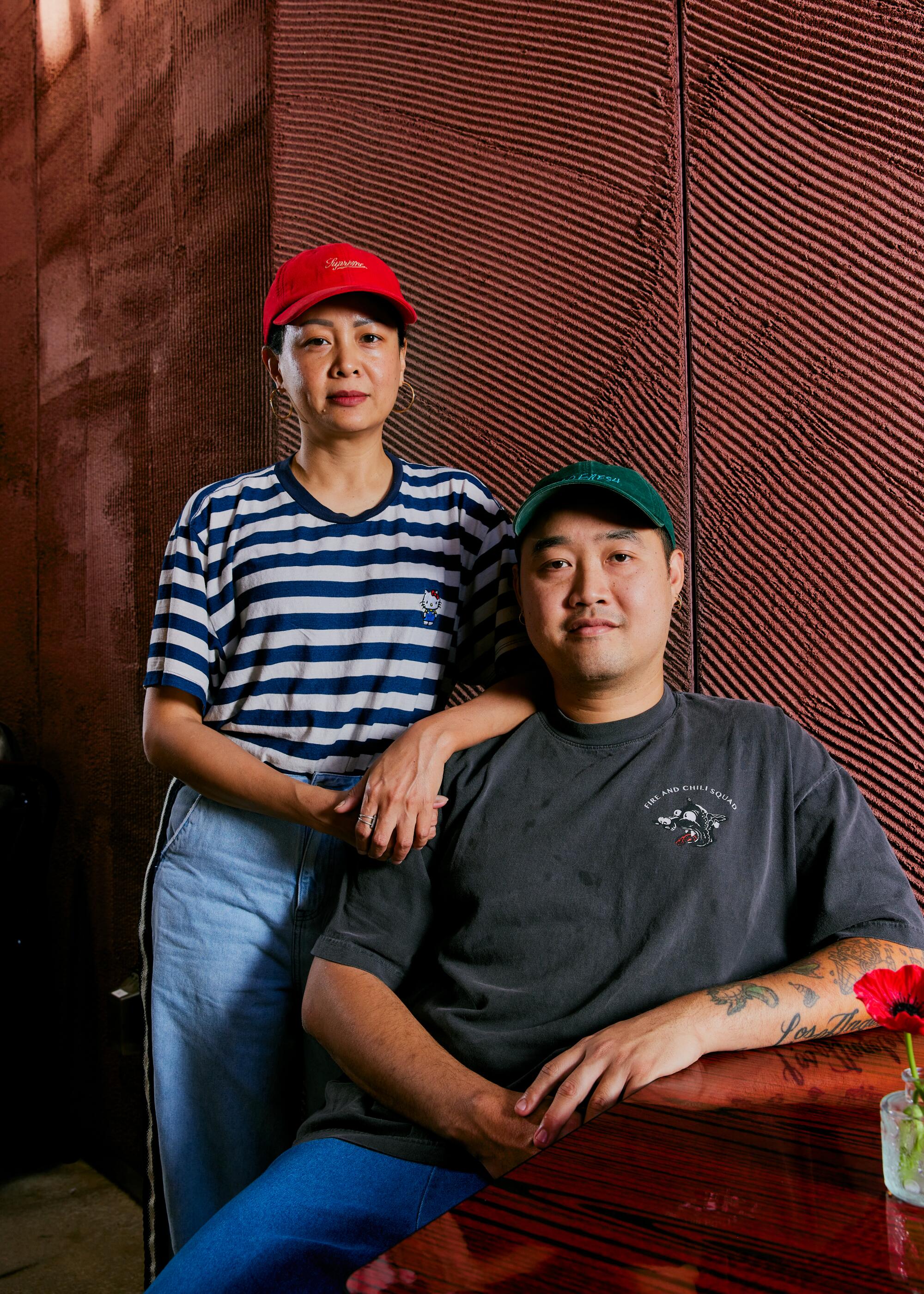
Arpapornnopparat and Yuon are ideas people. Before restaurants, they first waded into entrepreneurism with a line of natural sweeteners using fruits and herbs. Out of those efforts, Yuan developed a canned version of Thai iced tea with oat milk that’s arguably the best thing to sip at lunch or dinner while the Atwater Village awaits a liquor license.
For a while, before there were two restaurants to run, they’d hold weekend pop-ups in the downtown food hall called Yum Los Angeles; it was an incubator for some of the polished innovations I’ve mentioned. Originally, the couple conceived of their second location to serve Thai tasting menus, and they haven’t given up on opening a third place to pursue that ambition.
How excellent, though, when big dreamers land every stepping stone along the way.
Holy Basil Atwater Village
3170 Glendale Blvd., Unit C, Los Angeles, instagram.com/holybasil_la
Prices: Small plates $6-$18, noodles and rice dishes $16.50-$22, most entrees $16-$25.
Details: Monday-Friday, 11 a.m.-3 p.m. and 5-8:30 p.m., Saturday-Sunday, noon-3:30 p.m. and 5-8:30 p.m. Liquor license pending. Street parking. Restaurant takes reservations. I recommend going to dinner on the early side; the kitchen sometimes runs out of popular dishes. Street and lot parking.
Recommended dishes: Soft-shell crab in brown butter sauce, wild shrimp curry, moo krob, beef tataki, eggplant and squash, Grandma’s fish and rice.
More to Read
Eat your way across L.A.
Get our weekly Tasting Notes newsletter for reviews, news and more.
You may occasionally receive promotional content from the Los Angeles Times.
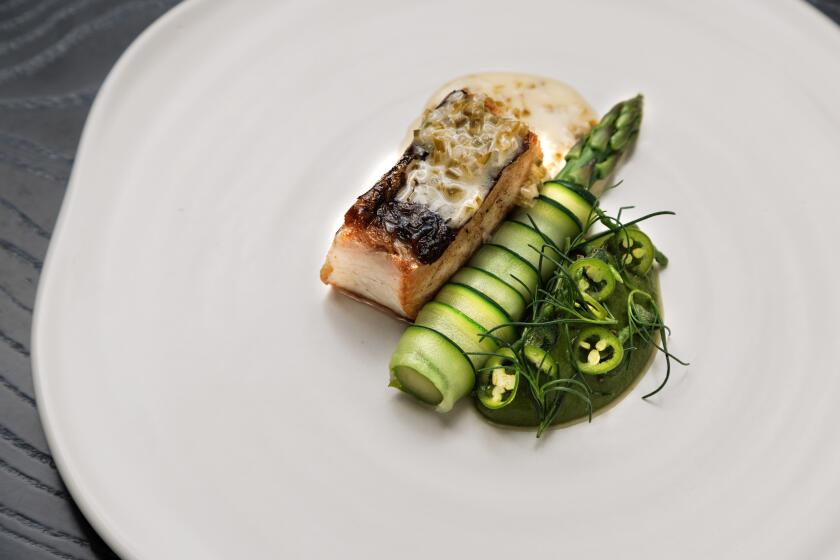
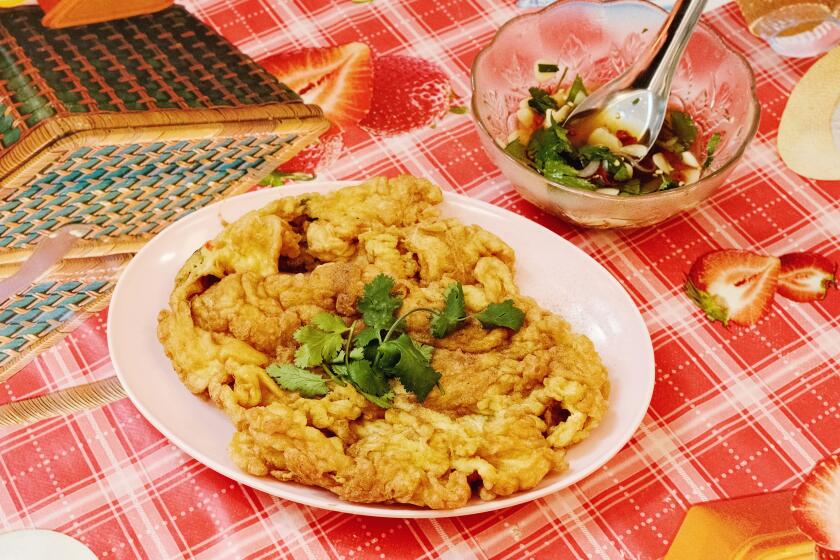
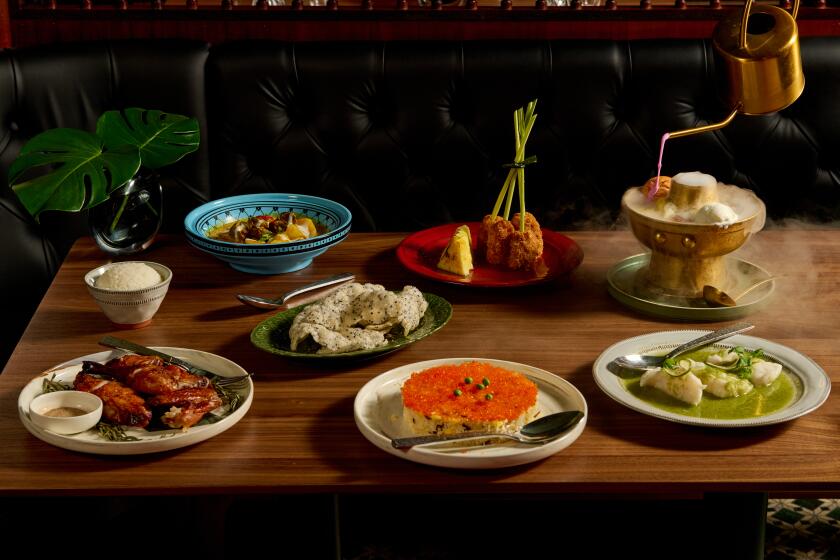
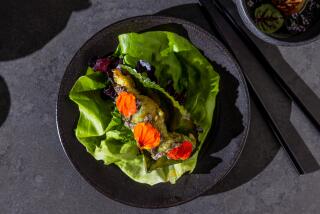
![LOS ANGELES, CA - JUNE 17: [Cody Ma and Misha Sesar share a few dishes from their Persian Restaurant Azizam] on Monday, June 17, 2024 in Los Angeles, CA. (Ethan Benavidez / For The Times)](https://ca-times.brightspotcdn.com/dims4/default/7ffc7f6/2147483647/strip/true/crop/5110x3417+306+0/resize/320x214!/quality/75/?url=https%3A%2F%2Fcalifornia-times-brightspot.s3.amazonaws.com%2F79%2Fdc%2F4d29255545f5b9813315901692bc%2F1459972-fo-azizam-review20-eba.JPG)
